Module 3 Culture and historyUnit 5 Educational exchanges Grammar 现在完成时课件(共56张PPT)
文档属性
| 名称 | Module 3 Culture and historyUnit 5 Educational exchanges Grammar 现在完成时课件(共56张PPT) |
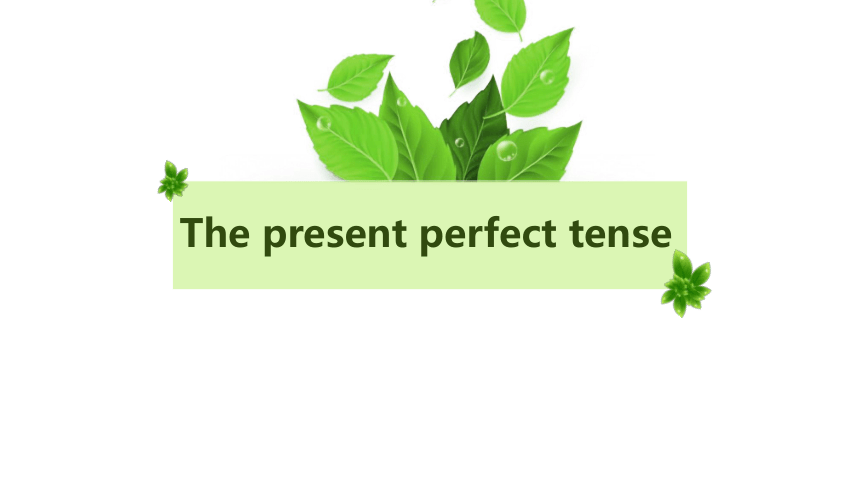
|
|
| 格式 | zip | ||
| 文件大小 | 8.3MB | ||
| 资源类型 | 教案 | ||
| 版本资源 | 牛津深圳版 | ||
| 科目 | 英语 | ||
| 更新时间 | 2021-10-24 14:22:36 | ||
图片预览


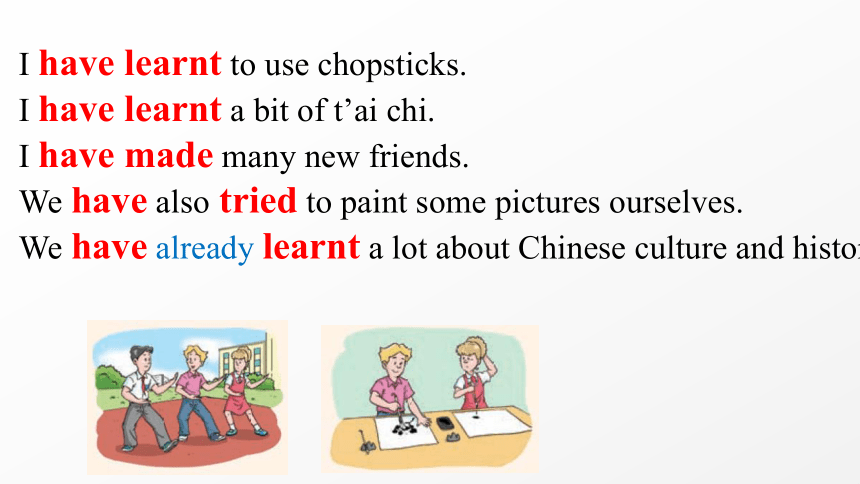
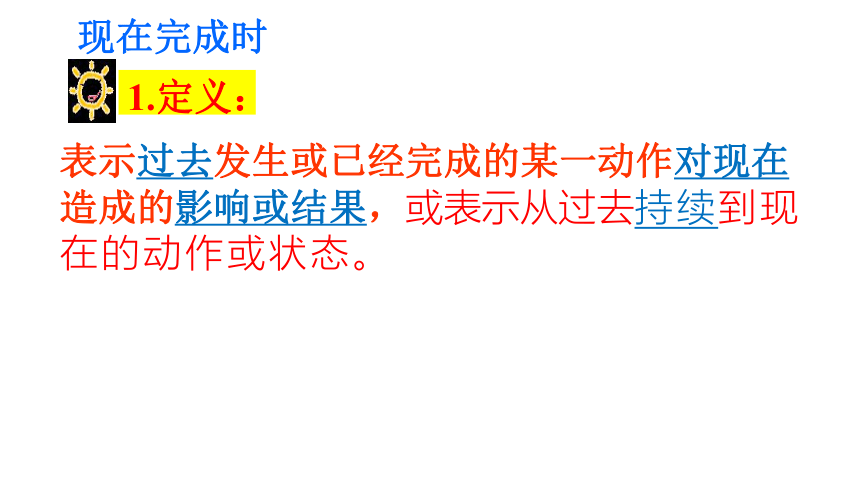
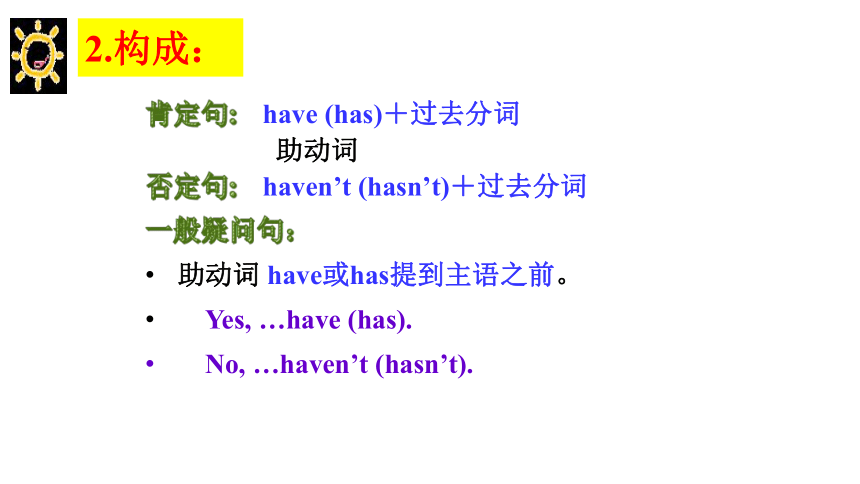
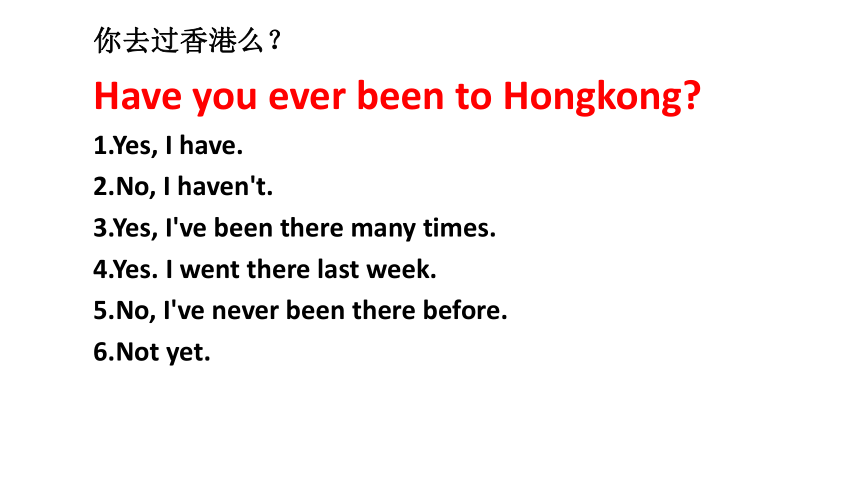
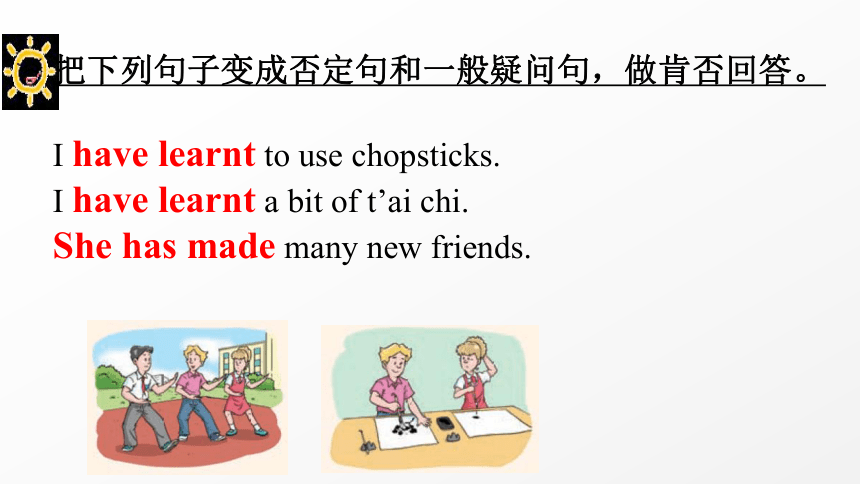
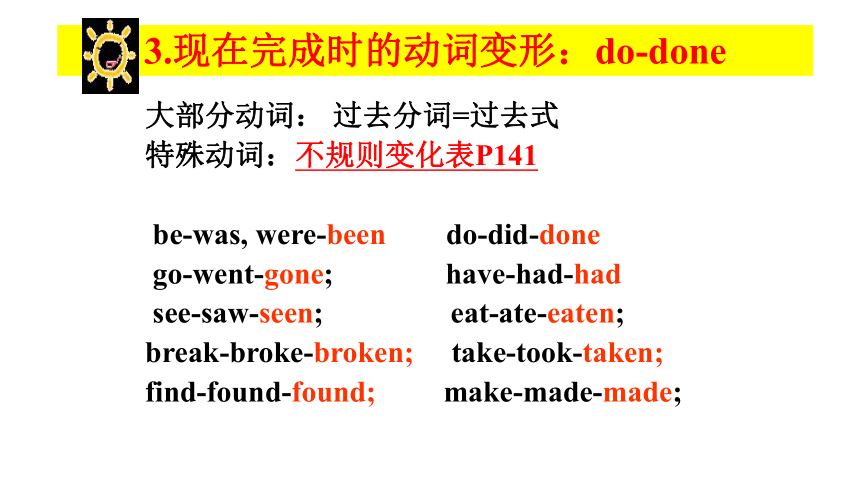
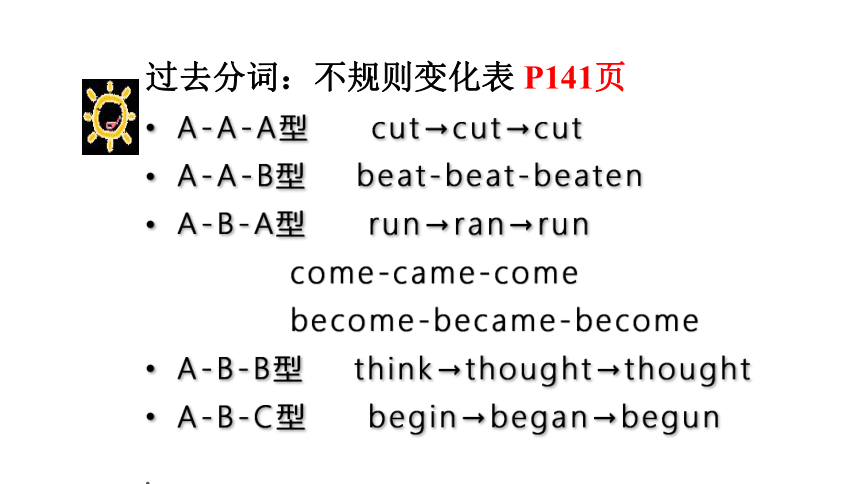
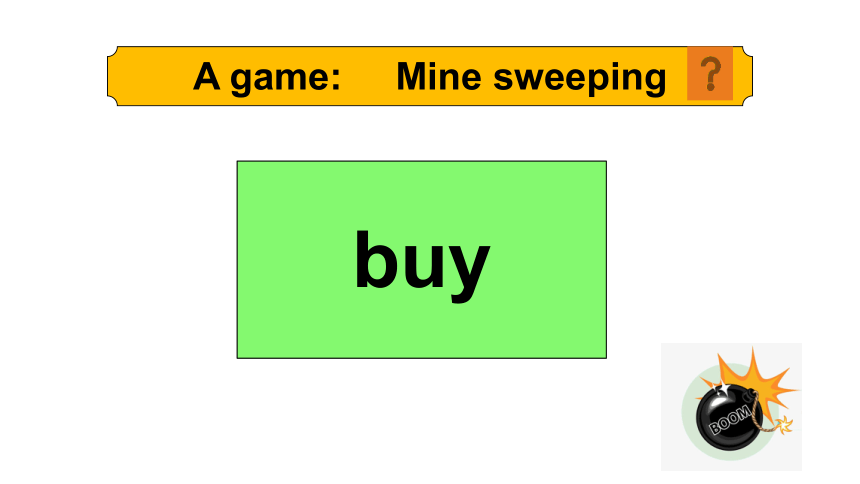

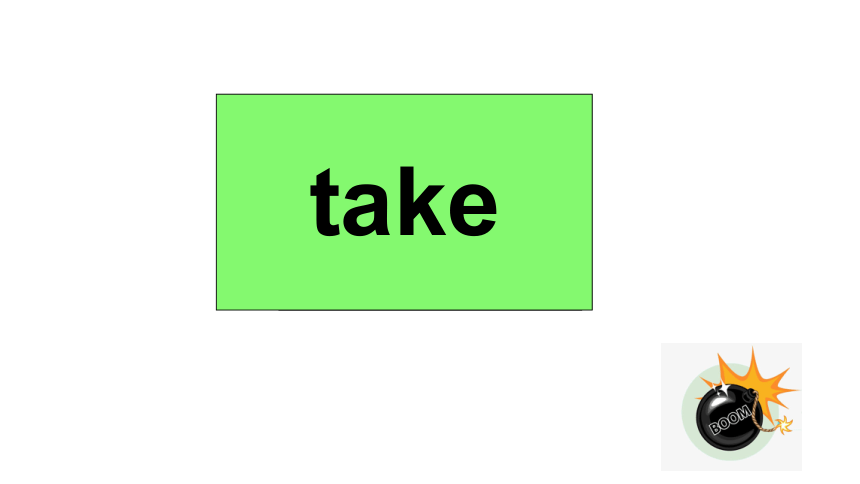
文档简介
(共56张PPT)
The present perfect tense
预习检测
I’ve learnt to use chopsticks.
It’s been a fantastic experience so far.
I’ve learnt a bit of t’ai chi.
We’ve already learnt a lot about Chinese culture and history.
The teachers have introduced us to Chinese painting as well.
We’ve also tried to paint some pictures ourselves.
I haven’t had much success yet.
I’ve made many new friends.
I have learnt to use chopsticks.
I have learnt a bit of t’ai chi.
I have made many new friends.
We have also tried to paint some pictures ourselves.
We have already learnt a lot about Chinese culture and history.
现在完成时
1.定义:
表示过去发生或已经完成的某一动作对现在造成的影响或结果,或表示从过去持续到现在的动作或状态。
肯定句: have (has)+过去分词
助动词
否定句: haven’t (hasn’t)+过去分词
一般疑问句:
助动词 have或has提到主语之前。
Yes, …have (has).
No, …haven’t (hasn’t).
2.构成:
ver
你去过香港么?
Have you ever been to Hongkong
1.Yes, I have.
2.No, I haven't.
3.Yes, I've been there many times.
4.Yes. I went there last week.
5.No, I've never been there before.
6.Not yet.
把下列句子变成否定句和一般疑问句,做肯否回答。
I have learnt to use chopsticks.
I have learnt a bit of t’ai chi.
She has made many new friends.
3.现在完成时的动词变形:do-done
大部分动词: 过去分词=过去式
特殊动词:不规则变化表P141
be-was, were-been do-did-done
go-went-gone; have-had-had
see-saw-seen; eat-ate-eaten;
break-broke-broken; take-took-taken;
find-found-found; make-made-made;
过去分词:不规则变化表 P141页
A-A-A型 cut→cut→cut
A-A-B型 beat-beat-beaten
A-B-A型 run→ran→run
come-came-come
become-became-become
A-B-B型 think→thought→thought
A-B-C型 begin→began→begun
1
buy
A game: Mine sweeping
1
bought
bought
3
take
took
taken
meet
met
met
3
eat
3
ate
eaten
drink
drank
drunk
I _______________________________
have taken several photos in Beijing.
take, several photos, Beijing
The boy ___________________________.
not eat; Beijing roast duck
hasn’t eaten Beijing roast duck
My uncle ___________________.
New York; be
has been to New York
They ______________________
_________________.
Hong Kong Disneyland; go; by bike
have gone to Hong Kong
Disneyland by bike
1. I haven’t had much success yet, but I’ll keep trying.
2. I’ve never visited another country.
3. They’ve already planned some weekend activities for you.
4. Sarah has already seen many places
of interest in Beijing.
5. — Have you ever seen the Great Wall yet
— No, I have not seen the Great wall.
4.现在完成时的标志词
already
yet
ever
never
just
before
once/twice/---times
so far=until now
=up to now
9. in the past/last five years
已经
已经/还
曾经
从未
刚刚
以前
一次/两次/---次
到目前为止
在过去的五年里
4.现在完成时的标志词
1. I’ve already had dinner.
I ________ _____ dinner ______.
2. He has already finished his homework.
He ______ _______ his homework ___.
3. I have ever been to Beijing .
I _____ _____ _____ to Beijing.
haven’t
had
yet
hasn’t
finished
yet
把下列句子改为否定句。
have never been
The boy ______________________
already; make a cake
has already made a cake.
___ Tim ____________________
______________
Has ever been to the Palace Museum by bus
Palace Museum, ever be, by bus
the plane, arrive, yet, not
The plane __________________
hasn’t arrived yet.
the Great Wall, never, have been to
Mary ____________________________.
has never been to the Great Wall
Australia, ever, have been to
Have you ____________________
ever been to Australia
The Great Wall; climb; ever
___ she ________________________
Has ever climbed the Great Wall
I/You/We/They have=I've/You've/We've/They've
He/She/It has=He’s/She’s/It’s
have not=haven’t has not=hasn’t
5.
注
意
1.现在完成时中的缩写
注
意
1.He's my English teacher.
(He's=He is )
2.Tom's English teacher is Mr Wang.
(Tom's Tom的)
3.He's been there for 2 hours.
(He’s =He has)
4. He's beaten by Tom.
(He's=He is)
5.Let's have a rest.
(Let's=Let us)
2.下列句子中的‘s 代表什么?
have/has been to 表示“曾到过”,说明已经去过某地;
have/has gone to 表示“已去(某地)”,说明正在途中或已到目的地。
have been in...... + 一段时间: 已待在某地一段时间了
他去过英格兰。
He has been to Britain.
他已经去英格兰了。
He has gone to Britain.
他呆在英国一周了。
He has been in Britain for a week.
3.现在完成时的三个特殊句式:
Eric
Beijing
Eric has been in Beijing for a week.
Eric arrived in Beijing a week ago.
4.现在完成时与一般过去时区别
现在完成时不与具体的过去时间状语连用。
have met
have played
has cooked
have studied
have seen
haven’t visited
haven’t done
Eric has been in Beijing for a plete his email to his mother with the present perfect tense of the verbs in brackets. (P 72)
A
S1: Has Alice ever toured around
Buckingham Palace
S2: No, she hasn’t. She’s never toured
around Buckingham Palace.
S1: Has George ever seen Big Ben
S2: Yes, he has. He saw it one and a half
years ago.
S1: Has he ever visited Tower Bridge
S2: No, he hasn’t. He’s never visited Tower
Bridge.
S1: Has he ever toured around Buckingham
Palace
S2: No, he hasn’t. He’s never toured around
Buckingham Palace.
S1: Has Robin ever seen Big Ben
S2: No, he hasn’t. He’s never seen Big Ben.
S1: Has he ever visited Tower Bridge
S2: Yes, he has. He visited it one year ago.
S1: Has he ever toured around Buckingham
Palace
S2: No, he hasn’t. He’s never toured around
Buckingham Palace.
Sarah wants to know whether the students from Beijing have visited any places in London before. Ask and answer questions in pairs. (P 73)
B1
S1: Have you done any shopping yet,
George
S2: Yes, I’ve already done some shopping.
S1: Have you seen Big Ben yet
S2: No, I haven’t seen it yet.
S1: Have you done any shopping yet, Robin
S2: Yes, I’ve already done some shopping.
S1: Have you seen Big Ben yet
S2: Yes, I’ve already seen it.
Later Sarah is asking the students from Beijing about what they have and have not done in London. Ask and answer questions in pairs. (P 73)
B2
1. I ________ (have) dinner. I am full.
2. We _________ (read) this story.
3. They _________ (see) the movie.
4. She __________ (buy) some nice toys.
5. I ____________ (finish) my homework
already.
6. We ___________ (wash) our clothes.
They’re clean now.
have had
have read
have seen
has bought
have finished
have washed
用所给单词的正确形式填空。
6.More practice
综合训练: 用动词的适当形式填空(注意时态)
1. --______ you _________your pen (mend)
--Yes, I _______.
--When_______ you _______ it --I __________ it yesterday.
2. --How do you like the film
--I ____________(not see) such a moving film before.
3.Millie's sister _______(join) the club last week. So she _________(be) in the club for nearly one week.
综合训练:
1. —Look! That man looks like Mr. Brown.
—It _____ be him, for he_____America.
A. can't;has gone to B. may not;has gone
C. may not;has gone D. may not;has gone
综合训练:
2. Diana can't go to the farm with her classmates because she _____ a bad cold.
A. will catch B. is catching
C. will catch D. is caught
综合训练:
3. Mary, along with her parents, _____ Hainan for a week and they will come back soon.
A. have been to B. has been in
C. have been in D. has been to
综合训练:
4. Mr Jiang _____ the company to develop the 5G network for years. Now he works as the chief engineer in it.
A. joined B. was a member of
C. has joined D. has been a member of
综合训练:
5. —Sorry, I'm late. Has the meeting begun
—It doesn't matter. The meeting _______ for several minutes.
A. has just begun B. has just been over
C. has just been on D. has just ended
综合训练:
6. —Sorry, I'm late. Has the meeting begun
—It doesn't matter. The meeting _____ for several minutes.
A. has just begun B. has just been over
C. has just been on D. has just ended
综合训练:
7. My friend's new restaurant in Wanda Plaza( 万达广场 )______ two years ago, but I ____ there so far.
A. has opened; haven't been
B. was open; haven't been
C. opened; haven't gone
D. has been open; haven't gone
综合训练:
8. —How long did you stay in Hainan during the summer holiday
—I ______ there for one week. I have never had such a happy holiday.
A. have stayed B. stayed
C. will stay D. has stayed
综合训练:
9. It_____ ten years _____ many changes_____in the town.
A. is; since; have taken place B. is; since; have taken place
C. was; since; have happened D. has been; since; took place
综合训练:
10. —_______you ever_______for a newspaper
—Yes, I have. I think it's a good experience for me.
A. Do; write B. Did; write
C. Have; written D. Will; write
I. 单选。
1. You have _____ a tall young man.
A. grown B. grown into
C. grown us D. grown up
2. I’m sorry, I ____ your name.
A. had forgotten B. forgot
C. have forgotten D. forgotten
3. Have you ever _____to the Great Wall
It’s very beautiful.
A. gone B. been C. went D. go
II. 根据所给词的适当形式填空。
1. Ann and Simon ___________ (finish)
their homework.
2. I ____ never ____ (read) such an
interesting book.
3. You ______________ (not write) to your
uncle yet. Remember to write to him.
4. — ___ Jack _____ (eat) Chinese food
— Yes, he has.
have finished
have read
haven’t written
Has eaten
5. Jim has never seen a panda, ____ he
6. We can’t find him anywhere. Perhaps
he ________ (go) home.
7. Mr. Green __________ (teach) us a
lot about social studies since September.
8. I _____never ____ (meet) her sister
before.
has
has gone
have
has taught
met
III. 按要求改写下列句子。(缩略词算一空)
Have you watched the film
(作否定回答)
____, ___ _______.
2. Simon has decided to go to the meeting.
(改为一般疑问句)
___ Simon ______ __ go to the meeting
3. She’s already finished her homework.
(改为否定句)
She ______ _______ her homework ___.
No I haven’t
Has decided to
hasn’t finished yet
4. I have met Jill and Jim. (对划线部分提问)
_____ _____ ____ met
5. They have visited the Summer Palace and
the Great Wall. (对划线部分提问)
_____ _____ they ______
Who have you
What have visited
IV. 汉译英。
他已经找到他的自行车了。
He has already found his bicycle.
2. 你曾经去过北京吗?
Have you ever been to Beijing
3. 他们还没有动身。
They haven’t started yet.
4. 你曾唱过这首英文歌吗?
Have you ever sung this English song
5. 我们从来没有听说过这件事。
We have never heard of it.
6. 我已经做完家庭作业了。
I have already finished my homework.
综合训练:
用for 或since填空:
1.I've taken driving lessons __________last month.
2.My sister has had her cell phone __________a month. 3.My friends haven't visited me __________ few days ago.
3.Tom has worn glasses __________ he was 7 years old.
4.It's five years ____________(for/since) we met last time.
现在完成时与非延续性动词:
(1) buy,borrow,die等非延续性动词(也称为瞬间动词)的肯定形式一般不能和表示一段时间的for短语及since短语(或从句)连用,这时要用相应的动词代替这些非延续性动词。
e.g.I have bought the bike for two years. (×)
I have had the bike for two years. (√)
我已经买了这辆自行车两年了。
由于buy是瞬间动词,无法延续两年,所以改为延续性动词had。
(2)非延续性动词与一段时间状语(for+一段时间、since)连用时可采用将非延续性动词转化为延续性动词的方式。
瞬间动词与延续动词的转换:
非延续性动词 延续性动词
come/go be in/at
begin/start be on
stop/finish/end be over
leave be away
get married be married
fall asleep be asleep
open be open
【注意】非延续性动词在现在完成时当中,不与for+一段时间以及since+时间点连用的时候不需要换成延续性动词
e.g. He has left here.
他已经离开了这里。
e.g. He has been away from here for two years.
他已经离开这里两年了。
A: Have you ever visited _____________________
B: No, I have never visited ____________________.
A: Have you ever eaten _________________
B: Yes, I have.
A: When did you eat it
B: I ate it ________________
the Great Wall
the Summer Palace
the Palace Museum
the Palace Museum
the roast duck
two years ago
A: Have you ever _____________________
B: No, I have never ____________________.
A: Have you ever _________________
B: Yes, I have.
A: When did you _________ it
B: I _____________ it ________________.
Thank you!
The present perfect tense
预习检测
I’ve learnt to use chopsticks.
It’s been a fantastic experience so far.
I’ve learnt a bit of t’ai chi.
We’ve already learnt a lot about Chinese culture and history.
The teachers have introduced us to Chinese painting as well.
We’ve also tried to paint some pictures ourselves.
I haven’t had much success yet.
I’ve made many new friends.
I have learnt to use chopsticks.
I have learnt a bit of t’ai chi.
I have made many new friends.
We have also tried to paint some pictures ourselves.
We have already learnt a lot about Chinese culture and history.
现在完成时
1.定义:
表示过去发生或已经完成的某一动作对现在造成的影响或结果,或表示从过去持续到现在的动作或状态。
肯定句: have (has)+过去分词
助动词
否定句: haven’t (hasn’t)+过去分词
一般疑问句:
助动词 have或has提到主语之前。
Yes, …have (has).
No, …haven’t (hasn’t).
2.构成:
ver
你去过香港么?
Have you ever been to Hongkong
1.Yes, I have.
2.No, I haven't.
3.Yes, I've been there many times.
4.Yes. I went there last week.
5.No, I've never been there before.
6.Not yet.
把下列句子变成否定句和一般疑问句,做肯否回答。
I have learnt to use chopsticks.
I have learnt a bit of t’ai chi.
She has made many new friends.
3.现在完成时的动词变形:do-done
大部分动词: 过去分词=过去式
特殊动词:不规则变化表P141
be-was, were-been do-did-done
go-went-gone; have-had-had
see-saw-seen; eat-ate-eaten;
break-broke-broken; take-took-taken;
find-found-found; make-made-made;
过去分词:不规则变化表 P141页
A-A-A型 cut→cut→cut
A-A-B型 beat-beat-beaten
A-B-A型 run→ran→run
come-came-come
become-became-become
A-B-B型 think→thought→thought
A-B-C型 begin→began→begun
1
buy
A game: Mine sweeping
1
bought
bought
3
take
took
taken
meet
met
met
3
eat
3
ate
eaten
drink
drank
drunk
I _______________________________
have taken several photos in Beijing.
take, several photos, Beijing
The boy ___________________________.
not eat; Beijing roast duck
hasn’t eaten Beijing roast duck
My uncle ___________________.
New York; be
has been to New York
They ______________________
_________________.
Hong Kong Disneyland; go; by bike
have gone to Hong Kong
Disneyland by bike
1. I haven’t had much success yet, but I’ll keep trying.
2. I’ve never visited another country.
3. They’ve already planned some weekend activities for you.
4. Sarah has already seen many places
of interest in Beijing.
5. — Have you ever seen the Great Wall yet
— No, I have not seen the Great wall.
4.现在完成时的标志词
already
yet
ever
never
just
before
once/twice/---times
so far=until now
=up to now
9. in the past/last five years
已经
已经/还
曾经
从未
刚刚
以前
一次/两次/---次
到目前为止
在过去的五年里
4.现在完成时的标志词
1. I’ve already had dinner.
I ________ _____ dinner ______.
2. He has already finished his homework.
He ______ _______ his homework ___.
3. I have ever been to Beijing .
I _____ _____ _____ to Beijing.
haven’t
had
yet
hasn’t
finished
yet
把下列句子改为否定句。
have never been
The boy ______________________
already; make a cake
has already made a cake.
___ Tim ____________________
______________
Has ever been to the Palace Museum by bus
Palace Museum, ever be, by bus
the plane, arrive, yet, not
The plane __________________
hasn’t arrived yet.
the Great Wall, never, have been to
Mary ____________________________.
has never been to the Great Wall
Australia, ever, have been to
Have you ____________________
ever been to Australia
The Great Wall; climb; ever
___ she ________________________
Has ever climbed the Great Wall
I/You/We/They have=I've/You've/We've/They've
He/She/It has=He’s/She’s/It’s
have not=haven’t has not=hasn’t
5.
注
意
1.现在完成时中的缩写
注
意
1.He's my English teacher.
(He's=He is )
2.Tom's English teacher is Mr Wang.
(Tom's Tom的)
3.He's been there for 2 hours.
(He’s =He has)
4. He's beaten by Tom.
(He's=He is)
5.Let's have a rest.
(Let's=Let us)
2.下列句子中的‘s 代表什么?
have/has been to 表示“曾到过”,说明已经去过某地;
have/has gone to 表示“已去(某地)”,说明正在途中或已到目的地。
have been in...... + 一段时间: 已待在某地一段时间了
他去过英格兰。
He has been to Britain.
他已经去英格兰了。
He has gone to Britain.
他呆在英国一周了。
He has been in Britain for a week.
3.现在完成时的三个特殊句式:
Eric
Beijing
Eric has been in Beijing for a week.
Eric arrived in Beijing a week ago.
4.现在完成时与一般过去时区别
现在完成时不与具体的过去时间状语连用。
have met
have played
has cooked
have studied
have seen
haven’t visited
haven’t done
Eric has been in Beijing for a plete his email to his mother with the present perfect tense of the verbs in brackets. (P 72)
A
S1: Has Alice ever toured around
Buckingham Palace
S2: No, she hasn’t. She’s never toured
around Buckingham Palace.
S1: Has George ever seen Big Ben
S2: Yes, he has. He saw it one and a half
years ago.
S1: Has he ever visited Tower Bridge
S2: No, he hasn’t. He’s never visited Tower
Bridge.
S1: Has he ever toured around Buckingham
Palace
S2: No, he hasn’t. He’s never toured around
Buckingham Palace.
S1: Has Robin ever seen Big Ben
S2: No, he hasn’t. He’s never seen Big Ben.
S1: Has he ever visited Tower Bridge
S2: Yes, he has. He visited it one year ago.
S1: Has he ever toured around Buckingham
Palace
S2: No, he hasn’t. He’s never toured around
Buckingham Palace.
Sarah wants to know whether the students from Beijing have visited any places in London before. Ask and answer questions in pairs. (P 73)
B1
S1: Have you done any shopping yet,
George
S2: Yes, I’ve already done some shopping.
S1: Have you seen Big Ben yet
S2: No, I haven’t seen it yet.
S1: Have you done any shopping yet, Robin
S2: Yes, I’ve already done some shopping.
S1: Have you seen Big Ben yet
S2: Yes, I’ve already seen it.
Later Sarah is asking the students from Beijing about what they have and have not done in London. Ask and answer questions in pairs. (P 73)
B2
1. I ________ (have) dinner. I am full.
2. We _________ (read) this story.
3. They _________ (see) the movie.
4. She __________ (buy) some nice toys.
5. I ____________ (finish) my homework
already.
6. We ___________ (wash) our clothes.
They’re clean now.
have had
have read
have seen
has bought
have finished
have washed
用所给单词的正确形式填空。
6.More practice
综合训练: 用动词的适当形式填空(注意时态)
1. --______ you _________your pen (mend)
--Yes, I _______.
--When_______ you _______ it --I __________ it yesterday.
2. --How do you like the film
--I ____________(not see) such a moving film before.
3.Millie's sister _______(join) the club last week. So she _________(be) in the club for nearly one week.
综合训练:
1. —Look! That man looks like Mr. Brown.
—It _____ be him, for he_____America.
A. can't;has gone to B. may not;has gone
C. may not;has gone D. may not;has gone
综合训练:
2. Diana can't go to the farm with her classmates because she _____ a bad cold.
A. will catch B. is catching
C. will catch D. is caught
综合训练:
3. Mary, along with her parents, _____ Hainan for a week and they will come back soon.
A. have been to B. has been in
C. have been in D. has been to
综合训练:
4. Mr Jiang _____ the company to develop the 5G network for years. Now he works as the chief engineer in it.
A. joined B. was a member of
C. has joined D. has been a member of
综合训练:
5. —Sorry, I'm late. Has the meeting begun
—It doesn't matter. The meeting _______ for several minutes.
A. has just begun B. has just been over
C. has just been on D. has just ended
综合训练:
6. —Sorry, I'm late. Has the meeting begun
—It doesn't matter. The meeting _____ for several minutes.
A. has just begun B. has just been over
C. has just been on D. has just ended
综合训练:
7. My friend's new restaurant in Wanda Plaza( 万达广场 )______ two years ago, but I ____ there so far.
A. has opened; haven't been
B. was open; haven't been
C. opened; haven't gone
D. has been open; haven't gone
综合训练:
8. —How long did you stay in Hainan during the summer holiday
—I ______ there for one week. I have never had such a happy holiday.
A. have stayed B. stayed
C. will stay D. has stayed
综合训练:
9. It_____ ten years _____ many changes_____in the town.
A. is; since; have taken place B. is; since; have taken place
C. was; since; have happened D. has been; since; took place
综合训练:
10. —_______you ever_______for a newspaper
—Yes, I have. I think it's a good experience for me.
A. Do; write B. Did; write
C. Have; written D. Will; write
I. 单选。
1. You have _____ a tall young man.
A. grown B. grown into
C. grown us D. grown up
2. I’m sorry, I ____ your name.
A. had forgotten B. forgot
C. have forgotten D. forgotten
3. Have you ever _____to the Great Wall
It’s very beautiful.
A. gone B. been C. went D. go
II. 根据所给词的适当形式填空。
1. Ann and Simon ___________ (finish)
their homework.
2. I ____ never ____ (read) such an
interesting book.
3. You ______________ (not write) to your
uncle yet. Remember to write to him.
4. — ___ Jack _____ (eat) Chinese food
— Yes, he has.
have finished
have read
haven’t written
Has eaten
5. Jim has never seen a panda, ____ he
6. We can’t find him anywhere. Perhaps
he ________ (go) home.
7. Mr. Green __________ (teach) us a
lot about social studies since September.
8. I _____never ____ (meet) her sister
before.
has
has gone
have
has taught
met
III. 按要求改写下列句子。(缩略词算一空)
Have you watched the film
(作否定回答)
____, ___ _______.
2. Simon has decided to go to the meeting.
(改为一般疑问句)
___ Simon ______ __ go to the meeting
3. She’s already finished her homework.
(改为否定句)
She ______ _______ her homework ___.
No I haven’t
Has decided to
hasn’t finished yet
4. I have met Jill and Jim. (对划线部分提问)
_____ _____ ____ met
5. They have visited the Summer Palace and
the Great Wall. (对划线部分提问)
_____ _____ they ______
Who have you
What have visited
IV. 汉译英。
他已经找到他的自行车了。
He has already found his bicycle.
2. 你曾经去过北京吗?
Have you ever been to Beijing
3. 他们还没有动身。
They haven’t started yet.
4. 你曾唱过这首英文歌吗?
Have you ever sung this English song
5. 我们从来没有听说过这件事。
We have never heard of it.
6. 我已经做完家庭作业了。
I have already finished my homework.
综合训练:
用for 或since填空:
1.I've taken driving lessons __________last month.
2.My sister has had her cell phone __________a month. 3.My friends haven't visited me __________ few days ago.
3.Tom has worn glasses __________ he was 7 years old.
4.It's five years ____________(for/since) we met last time.
现在完成时与非延续性动词:
(1) buy,borrow,die等非延续性动词(也称为瞬间动词)的肯定形式一般不能和表示一段时间的for短语及since短语(或从句)连用,这时要用相应的动词代替这些非延续性动词。
e.g.I have bought the bike for two years. (×)
I have had the bike for two years. (√)
我已经买了这辆自行车两年了。
由于buy是瞬间动词,无法延续两年,所以改为延续性动词had。
(2)非延续性动词与一段时间状语(for+一段时间、since)连用时可采用将非延续性动词转化为延续性动词的方式。
瞬间动词与延续动词的转换:
非延续性动词 延续性动词
come/go be in/at
begin/start be on
stop/finish/end be over
leave be away
get married be married
fall asleep be asleep
open be open
【注意】非延续性动词在现在完成时当中,不与for+一段时间以及since+时间点连用的时候不需要换成延续性动词
e.g. He has left here.
他已经离开了这里。
e.g. He has been away from here for two years.
他已经离开这里两年了。
A: Have you ever visited _____________________
B: No, I have never visited ____________________.
A: Have you ever eaten _________________
B: Yes, I have.
A: When did you eat it
B: I ate it ________________
the Great Wall
the Summer Palace
the Palace Museum
the Palace Museum
the roast duck
two years ago
A: Have you ever _____________________
B: No, I have never ____________________.
A: Have you ever _________________
B: Yes, I have.
A: When did you _________ it
B: I _____________ it ________________.
Thank you!
